Erik F. Tjong Kim Sang
Introduction to the CoNLL-2003 Shared Task: Language-Independent Named Entity Recognition
Jun 12, 2003



Abstract:We describe the CoNLL-2003 shared task: language-independent named entity recognition. We give background information on the data sets (English and German) and the evaluation method, present a general overview of the systems that have taken part in the task and discuss their performance.
Introduction to the CoNLL-2002 Shared Task: Language-Independent Named Entity Recognition
Sep 05, 2002
Abstract:We describe the CoNLL-2002 shared task: language-independent named entity recognition. We give background information on the data sets and the evaluation method, present a general overview of the systems that have taken part in the task and discuss their performance.
* 4 pages
Memory-Based Shallow Parsing
Apr 24, 2002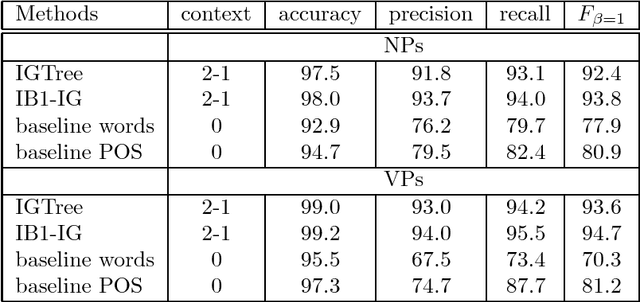


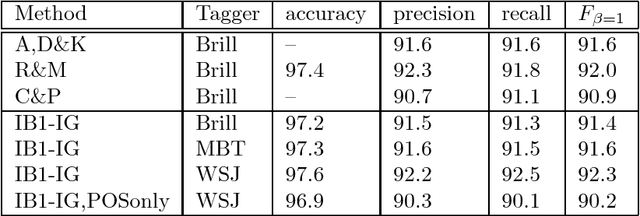
Abstract:We present memory-based learning approaches to shallow parsing and apply these to five tasks: base noun phrase identification, arbitrary base phrase recognition, clause detection, noun phrase parsing and full parsing. We use feature selection techniques and system combination methods for improving the performance of the memory-based learner. Our approach is evaluated on standard data sets and the results are compared with that of other systems. This reveals that our approach works well for base phrase identification while its application towards recognizing embedded structures leaves some room for improvement.
Combining a self-organising map with memory-based learning
Jul 15, 2001


Abstract:Memory-based learning (MBL) has enjoyed considerable success in corpus-based natural language processing (NLP) tasks and is thus a reliable method of getting a high-level of performance when building corpus-based NLP systems. However there is a bottleneck in MBL whereby any novel testing item has to be compared against all the training items in memory base. For this reason there has been some interest in various forms of memory editing whereby some method of selecting a subset of the memory base is employed to reduce the number of comparisons. This paper investigates the use of a modified self-organising map (SOM) to select a subset of the memory items for comparison. This method involves reducing the number of comparisons to a value proportional to the square root of the number of training items. The method is tested on the identification of base noun-phrases in the Wall Street Journal corpus, using sections 15 to 18 for training and section 20 for testing.
Learning Computational Grammars
Jul 15, 2001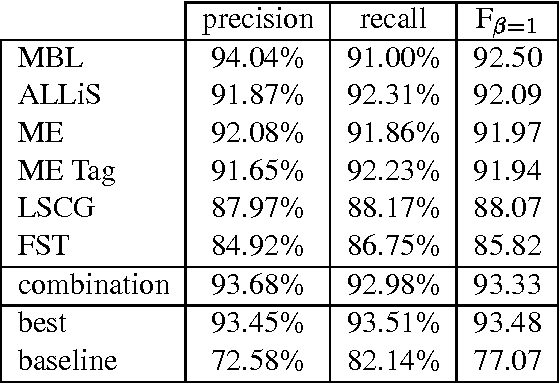
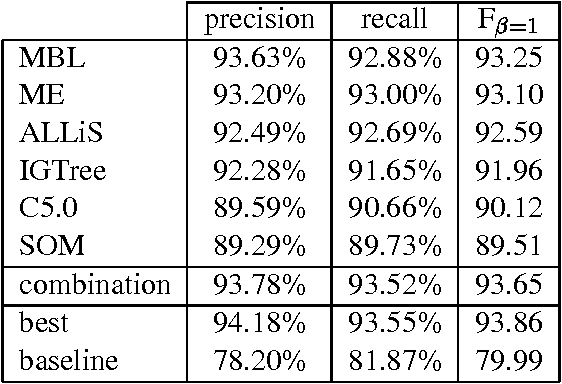
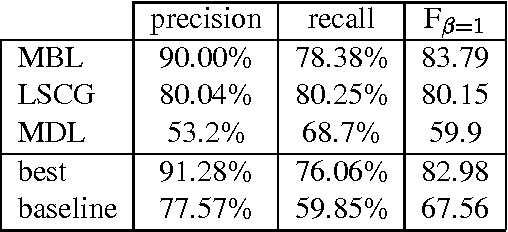
Abstract:This paper reports on the "Learning Computational Grammars" (LCG) project, a postdoc network devoted to studying the application of machine learning techniques to grammars suitable for computational use. We were interested in a more systematic survey to understand the relevance of many factors to the success of learning, esp. the availability of annotated data, the kind of dependencies in the data, and the availability of knowledge bases (grammars). We focused on syntax, esp. noun phrase (NP) syntax.
Introduction to the CoNLL-2001 Shared Task: Clause Identification
Jul 15, 2001


Abstract:We describe the CoNLL-2001 shared task: dividing text into clauses. We give background information on the data sets, present a general overview of the systems that have taken part in the shared task and briefly discuss their performance.
Introduction to the CoNLL-2000 Shared Task: Chunking
Sep 18, 2000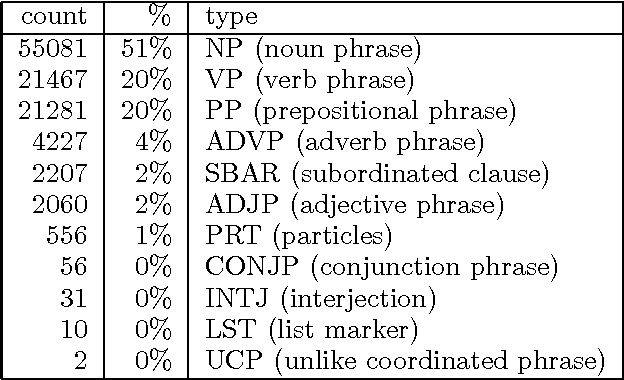
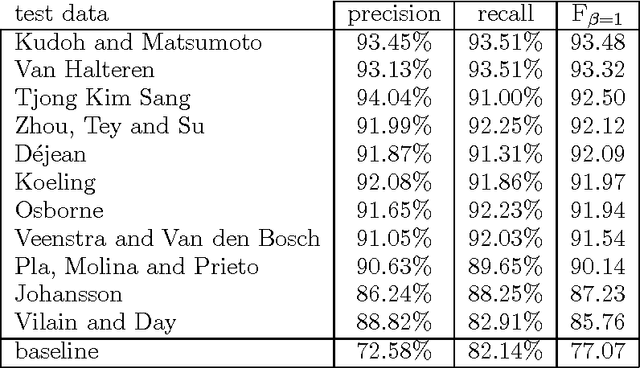
Abstract:We describe the CoNLL-2000 shared task: dividing text into syntactically related non-overlapping groups of words, so-called text chunking. We give background information on the data sets, present a general overview of the systems that have taken part in the shared task and briefly discuss their performance.
* 6 pages
Applying System Combination to Base Noun Phrase Identification
Aug 17, 2000
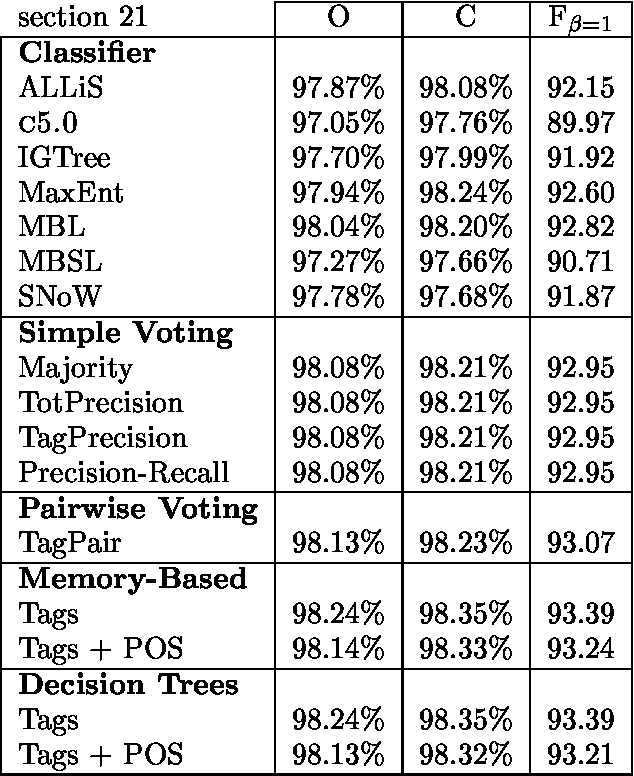

Abstract:We use seven machine learning algorithms for one task: identifying base noun phrases. The results have been processed by different system combination methods and all of these outperformed the best individual result. We have applied the seven learners with the best combinator, a majority vote of the top five systems, to a standard data set and managed to improve the best published result for this data set.
* 7 pages
Noun Phrase Recognition by System Combination
May 10, 2000


Abstract:The performance of machine learning algorithms can be improved by combining the output of different systems. In this paper we apply this idea to the recognition of noun phrases.We generate different classifiers by using different representations of the data. By combining the results with voting techniques described in (Van Halteren et.al. 1998) we manage to improve the best reported performances on standard data sets for base noun phrases and arbitrary noun phrases.
* 6 pages
Representing Text Chunks
Jul 06, 1999



Abstract:Dividing sentences in chunks of words is a useful preprocessing step for parsing, information extraction and information retrieval. (Ramshaw and Marcus, 1995) have introduced a "convenient" data representation for chunking by converting it to a tagging task. In this paper we will examine seven different data representations for the problem of recognizing noun phrase chunks. We will show that the the data representation choice has a minor influence on chunking performance. However, equipped with the most suitable data representation, our memory-based learning chunker was able to improve the best published chunking results for a standard data set.
* 7 pages
 Add to Chrome
Add to Chrome Add to Firefox
Add to Firefox Add to Edge
Add to Edge